As our world is burdened with ever-increasing plastic pollution, it has become necessary for each of us to take action to help sustain our planet. The need for commitment towards reducing plastic waste in products, selecting recyclable items, and adopting a plastic-free lifestyle is crucial to our Earth’s future. It is heartening to see a growing number of people joining the eco-friendly movement and making an effort to live a more sustainable lifestyle. The power is in our hands to make the necessary changes, such as using reusable products and being conscious of the materials we buy and use.
Key Takeaways
- Reducing plastic waste is essential for the environment and our planet’s survival.
- Choosing recyclable products and switching to a plastic-free lifestyle can make a significant impact.
- Join the eco-friendly movement to create a more sustainable world for future generations.
- Make conscious decisions to use reusable products and promote sustainability.
- Educate yourself and others on the importance of reducing plastic pollution for a healthier environment.
51 Effective Ways to Reducing Plastic Waste
Here is a list of 51 effective ways to reduce plastic waste, along with supporting statistics and tips:
1. Avoid single-use plastics
Single-use plastics like straws, bags, cutlery, and packaging make up 40% of all plastic waste. Say no to these disposable items whenever possible. Bring reusable shopping bags, keep cups, straws, and cutlery with you instead.
2. Stop buying bottled water
The US produces over 50 billion plastic water bottles per year, but only about 29% get recycled. Carry a reusable water bottle and use tap water instead.
3. Support bans on problematic plastics
Microbeads used in cosmetics and oxo-degradable plastics that break down into microplastics should be banned. Support legislation and companies doing this.
4. Shop smart
Avoid excessive packaging, choose products made from recycled materials, buy in bulk using your own containers. Check labels for recycling info.
5. Recycle properly
Follow local guidelines on what can and can’t be recycled. Sort items correctly and rinse when needed. 15 Only 9% of plastic gets recycled globally – do your part!
6. Compost food waste
Around 17% of plastic waste comes from food packaging. Composting food scraps reduces what goes to landfills and the need for plastic trash bags.
7. Bring reusable bags when shopping
The average person uses 500 plastic bags per year. Get into the habit of bringing reusable shopping bags. Some grocery stores even offer small discounts for using your own bag.
8. Avoid products with microplastics
Microplastics are used in certain cosmetics and personal care products as exfoliants. Choose plastic-free alternatives instead.
9. Choose fresh foods without packaging
Eat fresh fruits, vegetables, and bulk foods instead of processed and packaged foods. You’ll reduce plastic waste and eat healthier too.
10. Pack waste-free lunches
Use reusable lunch boxes, napkins, utensils, and drink containers. Make homemade meals instead of using plastic-wrapped convenience foods.
11. Use bar soaps and solid shampoos
Liquid soaps and shampoos are often packaged in plastic. Switch to bar soaps, solid shampoo bars, and use reusable pump bottles when possible.
12. Make your own cleaning products
Store-bought cleaners come in plastic bottles. Make your own using simple, natural ingredients like vinegar, baking soda, and lemon.
13. Avoid disposable cutlery and straws
Keep a set of reusable utensils in your bag or car to use when you’re on-the-go. Carry a metal or glass straw to use when dining out.
14. Let restaurants know plastic-free preferences
Request no plastic straws or cutlery if dining in. Bring your own container for takeout instead of using styrofoam.
15. Use reusable produce bags
Single-use plastic produce bags create tons of waste. Use reusable mesh or cloth bags instead. 13
16. Drink tap water
Get a reusable water bottle and fill up for free at water fountains instead of buying bottled water. This saves money and reduces plastic bottle waste.
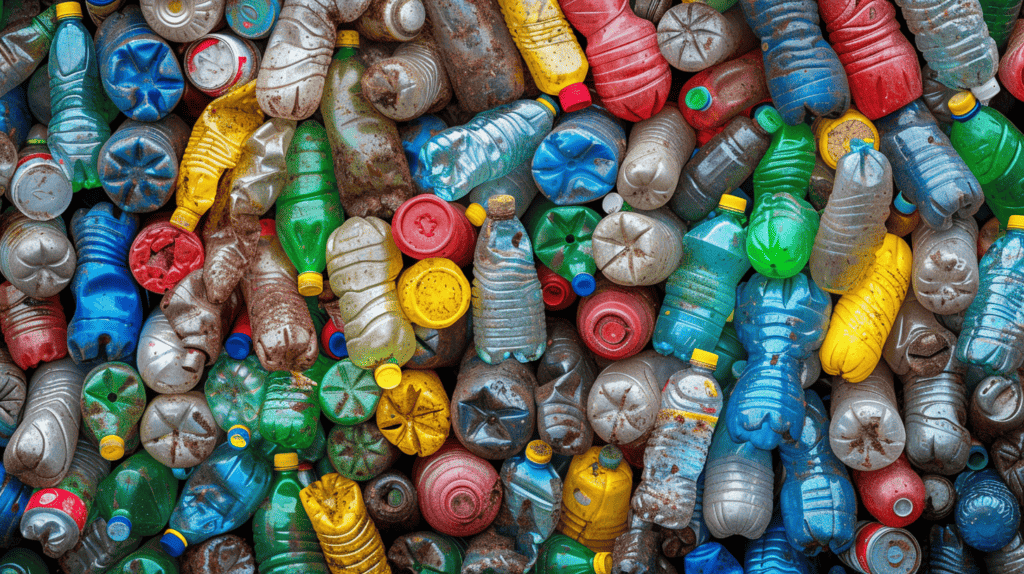
17. Buy second hand items
Shop at thrift stores or online markets like Craigslist and Facebook marketplace for furniture, clothing, and other household goods. This gives existing items new life instead of creating demand for new plastic-packaged products.
18. Avoid gum
Chewing gum is made of synthetic rubber, aka plastic. Look for plastic-free, biodegradable alternatives if you’re a gum chewer.
19. Use matches instead of disposable lighters
Plastic lighters are wasteful. Keep reusable matches on hand for lighting candles and other uses instead.
20. Don’t use plasticware at home
Opt for washable plates, cups, and utensils instead of disposable plastic options. This reduces waste and saves money.
21. Pack eco-friendly lunches
Use reusable containers, cloth napkins, and metal utensils to pack waste-free lunches. Prepare homemade meals instead of using disposable plastic-wrapped convenience foods.
22. Avoid frozen foods
Frozen foods are heavily packed in plastic. Buy fresh or make meals from scratch instead to reduce plastic waste.
23. Use solid laundry detergent
Liquid detergents come in plastic jugs while powdered varieties use cardboard. Switch to powder or detergent blocks to cut plastic.
24. Make DIY cleaning products
Make your own cleaners from simple ingredients like baking soda, vinegar, and soap. Not only will you reduce plastic waste, you’ll save money too!
25. Carry a metal straw
Many restaurants now only provide plastic straws upon request. Be prepared with your own reusable metal or glass straw.
26. Choose plastic-free teas
Many popular tea brands package tea bags in plastic. Choose loose leaf tea or brands that use compostable bags instead.
27. Buy plastic-free produce
Choosing loose fruits and veggies or those packaged in paper helps reduce plastic waste. You’ll also save money by not paying for unnecessary packaging!
28. Ditch the disposable razor
Disposable razors are made entirely of plastic. Use a metal safety razor with replaceable blades instead. The handles and blades are recyclable too.
29. Make DIY personal care products
Store bought personal care items often come in plastic packaging. Try making your own instead with simple, natural ingredients.
30. Avoid sample size items
Hotel toiletries, single-use packets of makeup/skincare, and other tiny sample products create lots of plastic waste. Buy full size or DIY alternatives instead.
31. Use bamboo toothbrushes
Billions of plastic toothbrushes end up in landfills annually. Choose biodegradable bamboo options instead.
32. Use bar soap
Bar soap lasts longer than liquid hand soap and doesn’t require plastic packaging. Keep bar soap handy for hand washing and bathing.
33. Buy in bulk
Foods like grains, nuts, pasta, and snacks often come in plastic bags or cardboard boxes lined with plastic. Purchase from bulk bins and fill reusable containers instead.
34. Make compost
Over 30% of household waste is made up of food and yard scraps. Compost these items instead of sending them to landfills in plastic bags.
35. Avoid plastic wrap
Plastic wrap is difficult to recycle. Choose reusable containers or beeswax wrap instead to cover food.
36. Pack eco-friendly takeout
Request restaurants avoid plastic cutlery and extra packaging for your takeout order. Bring your own reusable container too.
37. Use solid cleanser
Bar soap, shampoo, conditioner, and cleansing balms help reduce plastic waste from liquid cleansers. They also tend to last longer!
38. Choose plastic-free period products
Conventional tampons and pads contain lots of plastic. Try reusable cups, pads, period underwear, or 100% organic cotton tampons instead.
39. Make DIY cleaning wipes
Disposable cleaning wipes come in plastic tubs. Make your own from old cloth and reuse cleaning solution instead.
40. Buy cardboard instead of plastic bottles
Laundry detergent, window cleaner, and other cleaning products often come in plastic jugs. Seek out cardboard packaged alternatives.
41. Use matches instead of lighters
Plastic lighters are wasteful. Keep reusable matches on hand for lighting candles and other uses instead. 12
42. Avoid plastic packaging when gifting
Instead of wrapping gifts in plastic-coated paper, choose recyclable paper and materials like fabric scraps or raffia to tie it all together. Better yet, go plastic free by placing gifts in reusable bags or baskets.
43. Seek out plastic-free brands
Research brands that avoid excess plastic packaging and support their efforts. This helps encourage positive change.
44. Ditch the disposable razor
Disposable razors are made entirely of plastic. Use a metal safety razor with replaceable blades instead. The handles and blades are recyclable too.
45. Make DIY personal care products
Store bought personal care items often come in plastic packaging. Try making your own instead with simple, natural ingredients.
46. Avoid sample size items
Hotel toiletries, single-use packets of makeup/skincare, and other tiny sample products create lots of plastic waste. Buy full size or DIY alternatives instead.
47. Use bamboo toothbrushes
Billions of plastic toothbrushes end up in landfills annually. Choose biodegradable bamboo options instead.
48. Use bar soap
Bar soap lasts longer than liquid hand soap and doesn’t require plastic packaging. Keep bar soap handy for hand washing and bathing.
49. Bring reusable bags when shopping
Get into the habit of keeping reusable shopping bags in your car and purse so you have them handy when out shopping.
50. Support legislation
Contact government representatives to show your support for banning problem plastics, standardizing recycling programs, incentivizing reductions, and more.
51. Talk to friends and family
Share this information and plastic reduction tips with your social circle. Small changes by many people add up to big change!
Understanding Plastic Pollution and Its Consequences
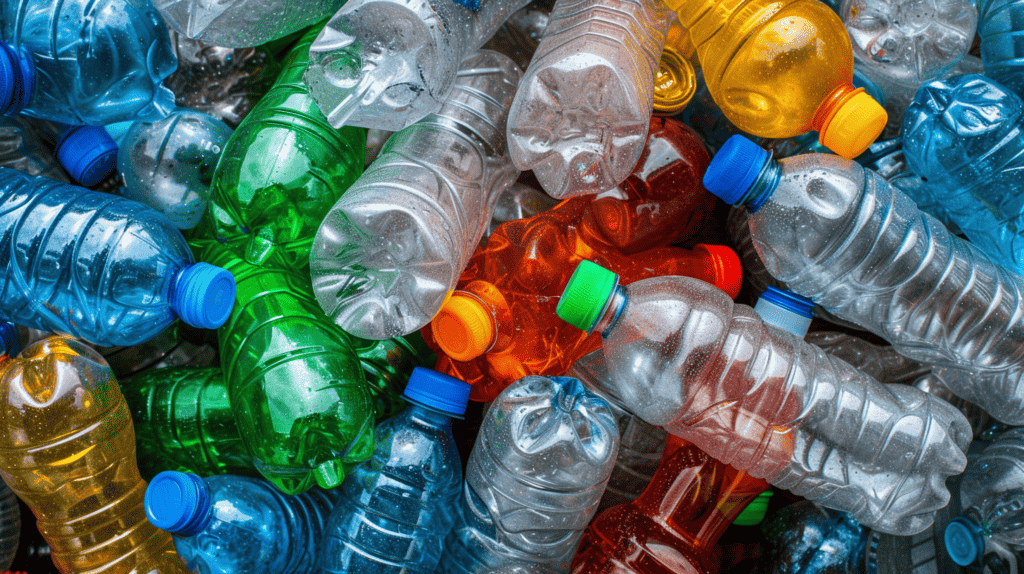
The globally recognized issue of plastic pollution is driven by the alarming quantity of plastic waste generated annually, resulting in millions of tons contaminating our oceans and ecosystems. Our reliance on plastic has far-reaching consequences that extend beyond the visual nuisance of litter and demand urgent attention. In this section, we will delve into the global impact of plastic waste, the crisis of plastic in our oceans, and the health risks associated with plastic use.
National Geographic suggests opting for products made from natural materials instead of plastics whenever possible.
The Global Impact of Plastic Waste
Every year, a staggering amount of plastic waste is produced, and a meager 16% of it is effectively recycled worldwide. The rest clogs landfills, is incinerated, or simply abandoned, exacerbating the insufficiency of global waste management infrastructure. Landfills are reaching their capacity, causing significant harm to the environment and local communities. Incineration, on the other hand, releases toxic chemicals into the air, contributing to air pollution and detrimental health effects.
Plastic in Our Oceans: The Growing Crisis
Approximately 8 million pieces of plastic find their way into the ocean every day, disturbing marine life and contributing to the staggering Pacific Garbage Patch phenomenon. This massive accumulation of plastic debris poses a severe threat to ocean ecosystems and countless marine species, from the tiniest plankton to the largest whales. Animals often mistake plastic for food, leading to life-threatening blockages of the digestive system or ingestion of toxic substances.
Health Risks Associated with Plastic Use
Many plastics contain compounds that may pose a threat to human health upon exposure, such as Bisphenol A (BPA) and phthalates. These chemicals can leach from plastic products, particularly those used for food storage, and enter our bodies through ingestion or inhalation. Studies have linked exposure to certain plastic chemicals with hormonal disruptions, developmental issues, and even an increased risk of cancer.
To combat the plastic pollution crisis, it’s crucial to tackle it from multiple angles, beginning with our personal habits and extending to wider community and legislative actions. Reducing plastic waste requires a collective effort to prioritize eco-friendly choices, foster awareness, and drive innovative solutions for a cleaner, more sustainable future.
Begin with Personal Changes
Reducing plastic waste starts with the small, everyday decisions we make. We can all play a critical role in decreasing our plastic consumption by making subtle shifts in our personal habits. There are numerous ways to begin this transformation, from choosing reusable bags and containers, saying no to single-use straws and utensils, to embracing bar soaps and making bulk purchases.
Choosing Reusable Bags and Containers
Instead of relying on disposable plastic bags for shopping, switch to durable cloth bags that can be used over and over again. By carrying these reusable bags, you significantly reduce plastic waste. Similarly, for food storage and packed lunches, opt for glass or silicone containers. These reusable containers are not only eco-friendly but also offer a sustainable, money-saving alternative to single-use plastic bags and wraps.
Saying No to Single-Use Straws and Utensils
Single-use plastic straws and cutlery contribute massively to plastic pollution. Eliminating these items from our lives is a crucial step towards personal change. Instead, choose reusable bamboo or metal alternatives, which are both sustainable and stylish. Keep a set of reusable utensils in your bag or at your desk, ready for any occasion that calls for them, and help reduce plastic waste one meal at a time.
Embracing Bar Soaps and Bulk Purchases
Switching to bar soaps for washing dishes and showering is another efficient strategy to minimize reliance on plastic packaging. Bar soaps typically come wrapped in paper or cardboard, making them a planet-friendly choice. Similarly, making bulk purchases of products like rice, beans, and pasta using your own paper or cloth bags helps cut down on single-use plastic packaging. Bulk purchases not only reduce plastic waste but can also save you money in the long run.
Shop Smarter to Reduce Plastic Footprint
Becoming a savvy shopper can meaningfully reduce one’s plastic footprint. This can involve selecting products packaged in glass or paper instead of plastic or supporting brands committed to using recyclable materials. Conscious decisions like declining plastic straws at restaurants and drive-throughs, choosing ice cream in cones, or favoring glass jars for peanut butter purchases are effective ways to make a difference. Dedicating to the use of vinegar for natural cleaning and baking soda for scrubbing purposes elevates the shopping experience into a plastic-reducing practice.
To further cultivate a waste reduction mindset, consider exploring the following sustainable shopping habits:
- Opt for reusable bags and containers: Instead of using single-use plastic bags or containers, invest in durable reusable bags and containers for your groceries and take-out food.
- Choose products with minimal packaging: Look for items with eco-friendly packaging, such as cardboard or glass, or even better, those with no packaging at all.
- Support sustainable businesses: Patronize stores and brands that prioritize waste reduction and strive to offer packaging alternatives.
- Refill liquid products: Some stores provide options to refill items like soap, shampoo, and laundry detergent, allowing you to reuse your plastic bottles instead of purchasing new ones.
- Buy in bulk: Purchasing larger quantities of non-perishable items can result in reduced packaging waste and potentially save you money.
Remember, every little effort counts towards a more sustainable world. By making the conscious choice to shop smarter and incorporating these eco-friendly practices into your shopping routines, together we can help reduce plastic waste and move toward a more sustainable lifestyle.
Substitutes for Common Plastic Items in Daily Life
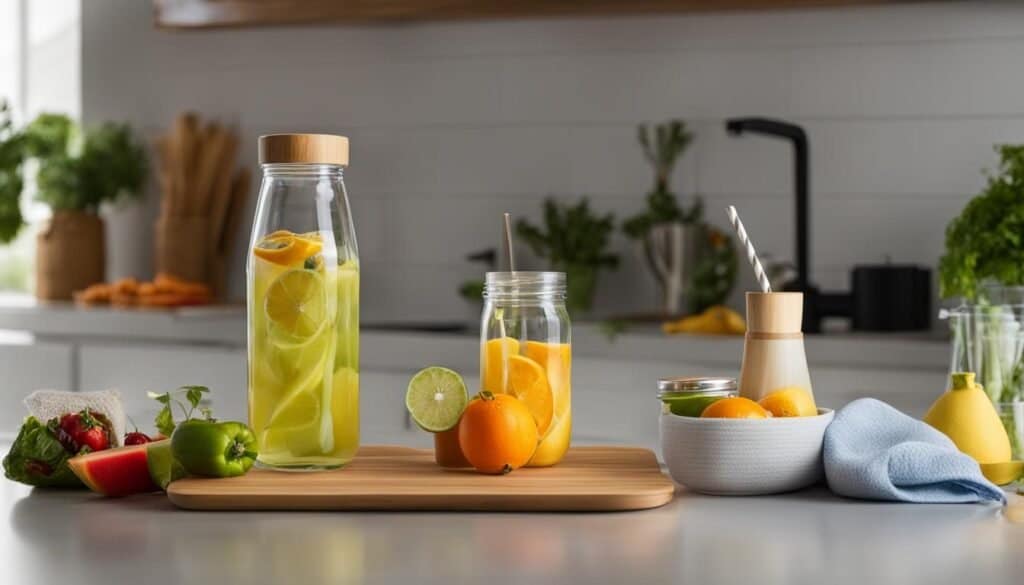
As we strive to create a more sustainable lifestyle, discovering substitutes for everyday plastic items is an effective way to reduce our impact on the environment. These alternatives not only contribute to reducing plastic use in our homes but also support our transition towards a greener and healthier way of living.
Alternative Materials for Household Goods
Replacing common household goods made of plastic with more eco-friendly materials can significantly reduce waste production. Consider switching from plastic cutting boards to wooden or glass ones, which offer a durable and functional alternative. Reusable silicone food storage bags or glass containers are also effective swaps for single-use plastic bags and wrap.
Eco-Friendly Personal Care and Hygiene Products
When it comes to personal care and hygiene products, a variety of eco-friendly options are available to minimize plastic consumption. For instance, bamboo toothbrushes and bar shampoos come as excellent alternatives to their plastic counterparts. Additionally, consider replacing disposable razors with reusable safety razors. With a little research, it’s simple to find high-quality, sustainable alternatives for these everyday items.
From Kitchen to Pantry: Reducing Plastic Use
Starting in the kitchen and pantry, there are numerous ways to reduce plastic use by switching to reusable and eco-friendly substitutes. For instance:
- Opt for cloth or mesh produce bags when grocery shopping.
- Store food in glass containers or jars, rather than single-use plastic bags or cling film.
- Use stainless steel lunch boxes or beeswax wraps to keep food fresh.
- Switch from plastic utensils to wooden, stainless steel, or bamboo ones.
Each of these solutions will make a positive impact in reducing plastic waste accumulation while promoting a more sustainable lifestyle. Gradually incorporating these eco-conscious practices into your daily routine will empower you to contribute to the global movement towards a cleaner and healthier planet.
Adopting Eco-Friendly Habits in Food Consumption
Embracing eco-friendly habits in our daily food consumption is a powerful way to adopt a more sustainable lifestyle. It involves considering the environmental impact of our choices, from the food we eat to the packaging it comes in. Let’s explore some simple yet effective practices that can make a significant difference in reducing plastic use and promoting sustainable eating.
One of the easiest switches is to frequent farmer’s markets where fresh produce is usually sold without plastic packaging. Not only do you get to enjoy locally sourced, seasonal fruits and vegetables, but you also support small businesses and reduce your plastic footprint. Similarly, opting for plastic-free packaging whenever possible encourages retailers and manufacturers to embrace environmentally-friendly alternatives.
- Choose milk in paper cartons or glass bottles instead of plastic containers.
- Purchase condiments, such as maple syrup and honey, in glass bottles rather than plastic.
- Buy bread and other baked goods wrapped in paper or bring your own cloth bags.
- Say “no straw, please” when ordering drinks or carry a reusable straw with you.
Additionally, consider modifying your kitchen practices to further reduce your plastic usage. For example, utilizing a reusable coffee pod instead of a single-use version can help cut down on waste. Moreover, composting leftover food scraps is a fantastic way to recycle and give back to the environment while simultaneously reducing the need for plastic bin liners.
| Eco-Friendly Habit | Benefits |
|---|---|
| Shopping at farmer’s markets | Reduces plastic packaging waste and supports local businesses |
| Choosing plastic-free packaging | Encourages environmentally-friendly alternatives and lessens plastic pollution |
| Opting for glass bottles and paper cartons | Minimizes plastic usage and promotes recyclable options |
| Composting food scraps | Recycles nutrients, lessens landfill waste, and reduces the need for plastic bin liners |
In summary, adopting eco-friendly habits in food consumption not only helps to mitigate the impact of plastic waste on the environment but also fosters a sense of connection to the earth and promotes living consciously. By making small adjustments to our shopping, eating, and kitchen practices, we can contribute to creating a sustainable and plastic-free future for all.
Reducing Plastic Waste in Products Through DIY Solutions
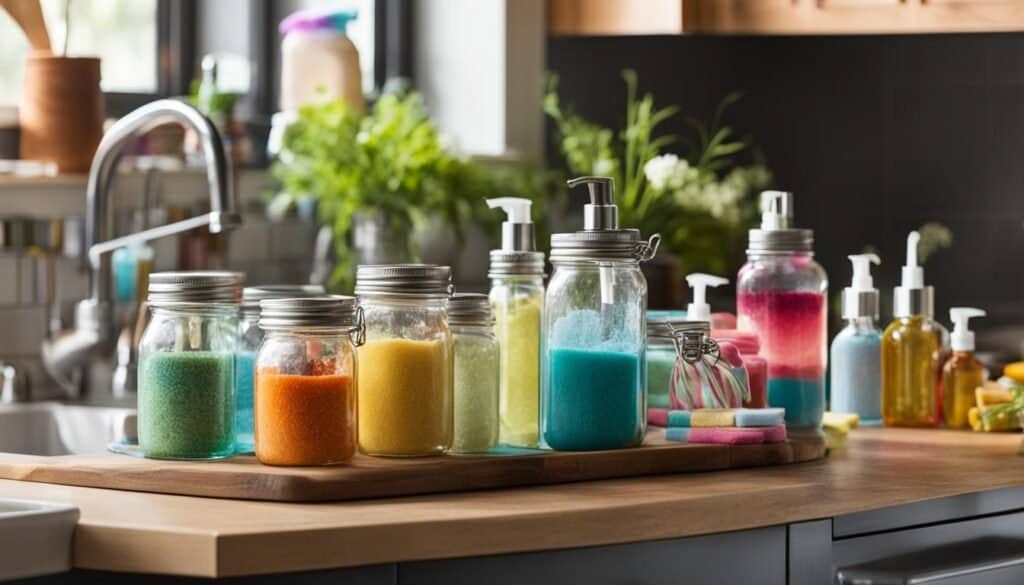
Do-It-Yourself (DIY) solutions provide a creative and effective approach to significantly reduce plastic waste in our daily lives. By harnessing the power of homemade cleaning products, handcrafted personal care items, and reusable alternatives, we can promote both a sustainable lifestyle and self-sufficiency.
Homemade Cleaning Products Minus the Plastic
One of the most accessible ways to decrease plastic consumption is by creating our own homemade cleaning products using natural ingredients. For instance, utilizing a mixture of baking soda and vinegar instead of store-bought cleaners eliminates the need for plastic containers and ensures a natural cleaning experience. Not only are these DIY cleaners eco-friendly, but they are also cost-effective and easy to make.
Crafting Your Own Personal Care Items
Beyond cleaning solutions, we can also explore the realm of handcrafted personal care items. From natural lip balms to homemade lotions, opting for DIY products means we can choose to store them in glass containers, further reducing our reliance on plastic. Plus, we can customize these personal care items to suit our preferences, ensuring they are gentle on both our skin and the environment.
Creating Reusable Alternatives at Home
Finally, embracing the art of making reusable alternatives at home can lead to even greater plastic waste reduction and increased self-sufficiency. For example, whipping up our own yogurt in glass jars not only cuts back on single-use plastic packaging, but also encourages a healthy, additive-free snack. Additionally, using beeswax-coated cloth wraps as a substitute for plastic wrap in the kitchen can help us store and transport food in an eco-friendly manner while keeping leftovers fresh and appealing. With these simple DIY solutions, we can make a profound and lasting transformation in our journey towards a more sustainable world.
Community Action and Supporting Legislative Measures
While individual contributions to reducing plastic waste are essential, collective action within the community and support for legislative measures can amplify the impact. By advocating for bans on plastic bags, endorsing local businesses with sustainable practices, and actively participating in cleanup drives and recycling programs, we can foster an eco-conscious community culture committed to sustainable waste management.
Supporting Bans on Plastic Bags
Bans on plastic bags have proven to be effective at the local and national level. By voicing our support for such legislative measures, we can urge policymakers to adopt and enforce these bans, ultimately minimizing plastic waste from disposable bags. Patronizing stores that offer reusable bags or bag-free shopping can confirm that these businesses align with our commitment to sustainability.
Encouraging Local Businesses to Cut Plastic Usage
Local businesses play a crucial role in reducing plastic usage within a community. We can promote sustainable practices by choosing to support establishments that prioritize eco-friendly packaging and minimize single-use plastics. Beyond spending our money with these businesses, we can use social media and word-of-mouth to spread the word, inspiring other companies to adopt similar practices.
Participating in Cleanup Drives and Recycling Programs
Active participation in cleanup drives and recycling programs not only helps remove existing waste, but also raises awareness about the importance of proper waste management. Volunteering at local recycling centers and joining neighborhood cleanup efforts allow us to demonstrate our dedication to the cause and encourage others to take action in the fight against plastic pollution.
By joining together and taking community action, including supporting legislative measures and local businesses, we can significantly reduce plastic usage and waste at a broader scale. Growing the eco-conscious movement through activism and cooperation will undoubtedly result in a healthier and cleaner environment for future generations.
Advocacy and Education: Spreading Awareness About Plastic Waste
The path to a plastic-reduced future is heavily contingent upon advocacy, education, and spreading awareness about the detrimental effects of plastic waste on our environment. Sharing knowledge and engaging in open discussions about plastic pollution and its risks can inspire change within communities and beyond, promoting pollution prevention and environmental education. By utilizing platforms like social media, and participating in community events, individuals can play a crucial role in educating peers about the importance of reducing plastic use.
It is our collective responsibility to join the green movement and take actionable steps towards a sustainable future.
- Organize workshops or give presentations in schools, local organizations, or at community centers to promote eco-friendly practices.
- Initiate awareness campaigns through social media, utilizing hashtags and visuals to highlight the environmental impact of plastic waste.
- Conduct public awareness drives distributing pamphlets, posters, or infographics advocating for the reduction of plastic usage.
These endeavors are essential in fostering eco-conscious mindsets, motivating others to join the eco-friendly cause, and taking the first steps toward a more sustainable future. Through continuous education and shared responsibility, we can help minimize plastic pollution, contributing significantly to the global green movement.
Conclusion on Reducing Plastic Waste in Products
In conclusion, our journey toward reducing plastic waste and using less in our daily lives is truly multifaceted, as it involves a wide range of actionable choices spanning from personal habit changes to community activism. Embracing reusable products is an essential step, as is supporting plastic reduction measures and fostering an environment of education and action.
By making these eco-conscious choices, we become part of a global movement towards sustainability and pave the way for a future with significantly reduced plastic consumption. As we work towards this sustainable future, it is crucial to continuously seek innovative solutions and remain committed to adopting eco-friendly habits and choices.
Together, through our collective efforts and determination, we can bring about a gratifying transformation that will ultimately lead to a cleaner, greener, and healthier planet for ourselves and generations to come.
FAQ on How to Reduce Your Plastic
Q: What are some effective ways to reduce plastic waste in products and use less?
A: There are numerous effective ways to reduce plastic waste and use less plastic, such as using reusable shopping bags, opting for products with minimal packaging, switching to wool dryer balls instead of single-use dryer sheets, and choosing menstrual cups over disposable tampons or pads.
Q: How can I reduce the amount of plastic I use in my daily life?
A: You can reduce the amount of plastic you use in your daily life by investing in reusable water bottles and coffee cups, avoiding single-use plastic cutlery and straws, and opting for products made from sustainable materials rather than virgin plastic.
Q: What are some tips to reduce plastic waste in household products, such as laundry detergent?
A: You can reduce plastic waste in household products like laundry detergent by choosing concentrated formulas that require less packaging, opting for refillable or bulk options, or even making your own eco-friendly laundry detergent at home.
Q: How can I reduce the plastic waste generated from using single-use products?
A: You can reduce the plastic waste from single-use products by choosing reusable alternatives, such as replacing single-use plastic water bottles with a reusable water bottle, using cloth napkins instead of disposable ones, and investing in durable, long-lasting goods rather than single-use items.
Q: What are some specific actions I can take to reduce plastic waste in my daily routine?
A: Some specific actions you can take to reduce plastic waste in your daily routine include recycling effectively, participating in plastic drop-off programs, and being mindful about the plastic products you purchase and use in your daily life.
Q: How much plastic waste can be reduced by using wool dryer balls instead of single-use dryer sheets?
A: By using wool dryer balls instead of single-use dryer sheets, you can significantly reduce the amount of plastic waste generated from laundry products, contributing to the overall reduction of plastic waste in household activities.
Q: How do menstrual cups help reduce plastic waste compared to disposable tampons or pads?
A: Menstrual cups help reduce plastic waste compared to disposable tampons or pads because they are reusable, lasting for years with proper care, whereas disposable menstrual products contribute to a significant amount of plastic waste annually.
Q: What is the environmental impact of using reusable shopping bags instead of single-use plastic bags?
A: Using reusable shopping bags instead of single-use plastic bags can have a positive environmental impact by reducing the amount of plastic bags used and discarded, ultimately decreasing the presence of non-biodegradable plastic in landfills and natural environments.
Q: How can individuals keep plastic waste at bay in their daily lives?
A: Individuals can keep plastic waste at bay in their daily lives by being conscious of their consumption habits, making informed purchasing decisions, and actively seeking out alternatives and strategies to minimize their use of plastic in various aspects of daily living.
Q: What are some key reasons to focus on using less plastic and reducing plastic waste?
A: Focusing on using less plastic and reducing plastic waste is crucial due to the detrimental impact of plastic pollution on marine life, natural ecosystems, and human health, as well as the staggering amount of millions of tons of plastic waste that accumulates annually and its contribution to the global plastic waste problem.
Source Links
- https://www.reefrelief.org/2013/01/51-ways-to-reduce-plastic-use-or-completely-eliminate-it/
- https://www.reddit.com/r/sustainability/comments/luinow/50_ways_to_reduce_plastic_use_megathread/
- https://www.organiccottonmart.com/blogs/sustainable-lifestyle/ways-to-reduce-plastic-usage-in-your-home-and-life

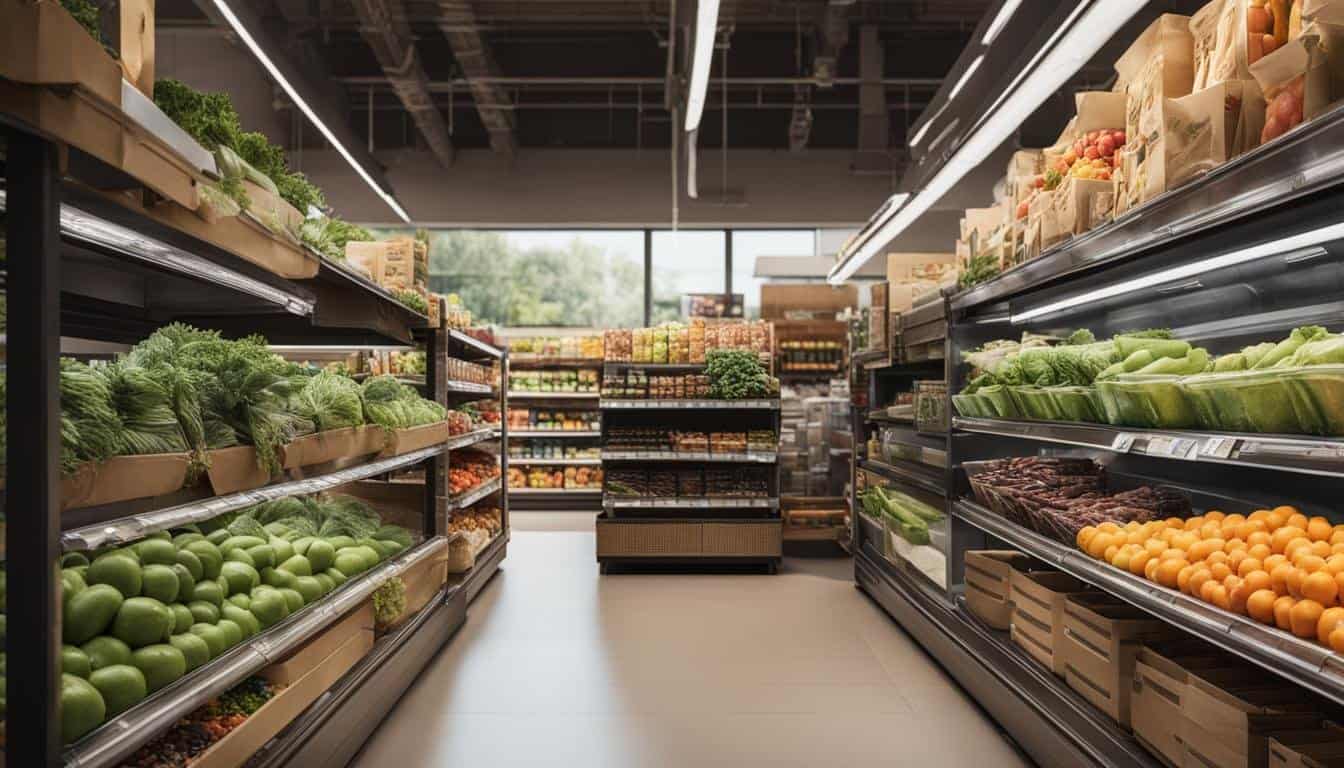


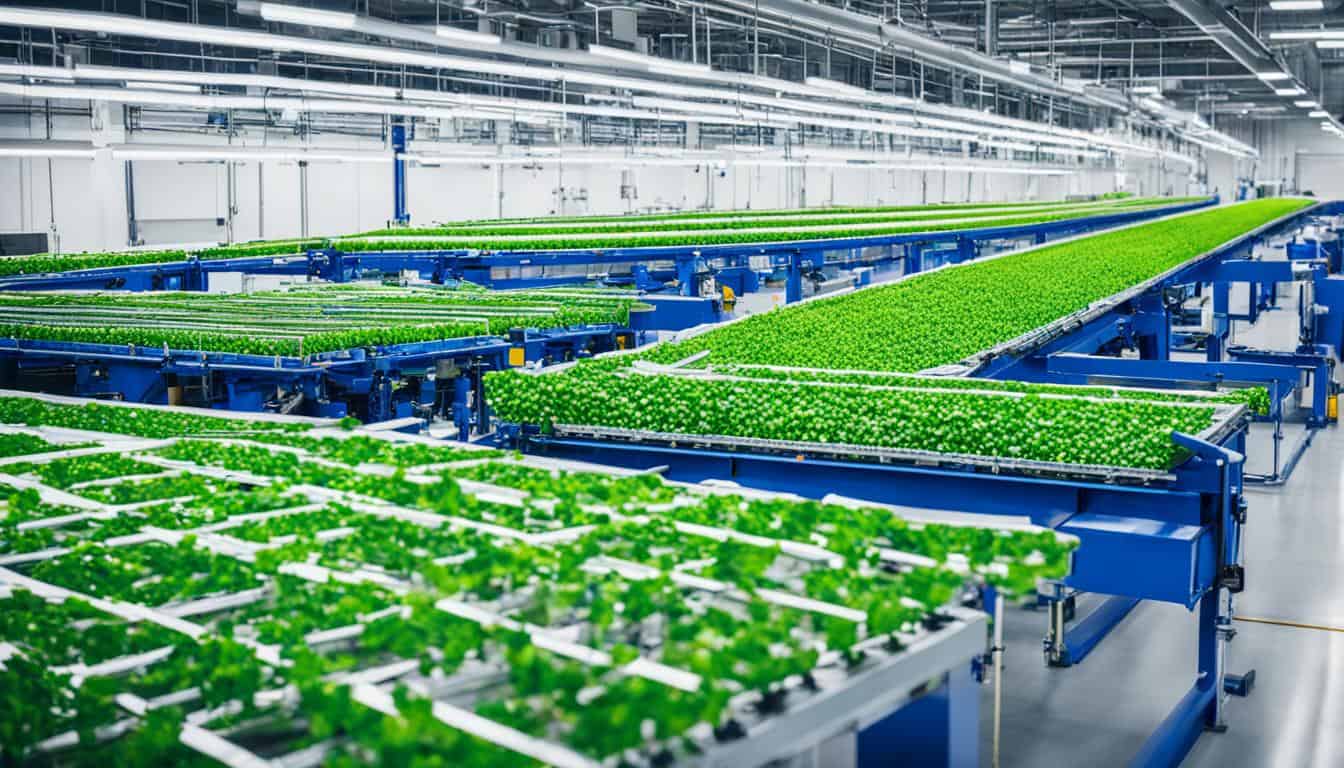
Leave a Reply